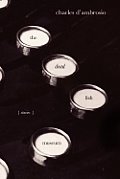 Charles D’Ambrosio’s second story collection, The Dead Fish Museum, is a collection of eight short stories, six of which were previously published in The New Yorker. D’Ambrosio has masterfully captured human misery, exposing the darkest place of the human soul to the light of day. Reading some of these stories can be likened to picking up a rock and finding maggots, except in this case, what the reader finds are realities most wish to hide from themselves.
Charles D’Ambrosio’s second story collection, The Dead Fish Museum, is a collection of eight short stories, six of which were previously published in The New Yorker. D’Ambrosio has masterfully captured human misery, exposing the darkest place of the human soul to the light of day. Reading some of these stories can be likened to picking up a rock and finding maggots, except in this case, what the reader finds are realities most wish to hide from themselves. In The Dead Fish Museum, normal lives and healthy relationships are an illusion. D’Ambrosio’s characters are the forsaken, the lost and the marginal of society. A consistent theme found within his stories is despair, often beyond that felt by the “average” person.
Within these eight short stories, individuals are mired in lives where hope barely exists. In ‘Screenwriter,’ the narrator meets a ballerina in rehab, a young woman who burns her flesh to put “the pain in a place I can find it. On the outside.” The narrator suffers from despair; however the ballerina, while appearing to be on the road to recovery, suffers from a deeper anguish which is continually exposed through her attacks on her skin. Ramage, the protagonist of the collection’s titular story, ‘The Dead Fish Museum,’ carries with him a gun which is both his adversary and his passion: “a theater where he poured out his lonely ardor, rehearsing scenarios, playing with possibilities.” While in his mind Ramage still believes he will use the gun to end his life, in reality the gun has become a talisman with all the same comforts a security blanket cedes to a child.
The agony with which D’Ambrosio infuses his stories is almost unbearable, yet there is beauty to be found in his evocative descriptions and word choices. In ‘Screenwriter’ he describes the ballerina’s grandparents: “…with their hopeless, past-tense faces and their old leafy clothes; standing beside them in a gauzy spring dress, the ballerina seemed a mere puff of self, passing like a spirit out of their heavy Old World sadness, whatever it was about.” He shoots out words until their sharp edges almost wound the reader. In ‘Drummond & Son,’ Pete suddenly confronts his father with the statement “Jesus Christ was brain-dead,” a phrase which stops readers dead, like a slap in the face. With one simple, yet aggressive phrase, D’Ambrosio pulls away from the comfort provided by the straightforward narrative, and forces readers to feel Drummond’s despair and loneliness.
Charles D’Ambrosio is the author of two short story collections, The Dead Fish Museum and The Point, as well as Orphans, a collection of essays. A finalist for the Pen/Hemingway Award for his first story collection, D’Ambrosio is known to many as a “writer’s writer,” one who continues to plow his own path, writing essays and stories about what interests him in the world. As he shared in an interview with Dan Wickett (Emerging Writers Forum): “Stories strike a more resonant chord in my soul and wrestling with them I usually come out the other end feeling renewed; essays leave me feeling a little ragged.”
D’Ambrosio is not an author who hawks his work, in fact he is leery of the entire business of promotion. For Orphans, he sent copies of the collection to some bloggers: “The only thing I did on my own was share the book with various bloggers. I'd never heard of these things, these blogs, until the book came out, but my name came up on a few, and I got a quick education, and it immediately seemed like a place where the whole conversation of books, largely an underground thing, these days, was still alive and even thriving. I can't say I sold any books because of blogs but I don't really care --things circulated, and that's enough for me.”
The Dead Fish Museum has garnered a great deal of attention in the blogosphere and quickly became a favourite, promoted on most of the highly respected litblogs. However, no litblog explains D’Ambrosio’s standing as a writer as well as this review by Kirkus Reviews: “Though D'Ambrosio is hardly among the most prolific writers of the contemporary American short story, he ranks with the best....”
Read the review at ReadySteadyBook.
ISBN10: 1400042860
Publisher: Alfred A. Knopf
Publication Date: April 18, 2006
Binding: Hardcover
tags: books book reviews Charles D'Ambrosio fiction short stories The New Yorker


2 comments:
talk about a horrible title...
I would definitely steer clear of this book if I saw it at the store, but then again, I have ichthyophobia ... ;)
Yeah, a fear of fish would be a reason to steer clear of this book. LOL
Fish are featured in a number of the stories.
Post a Comment